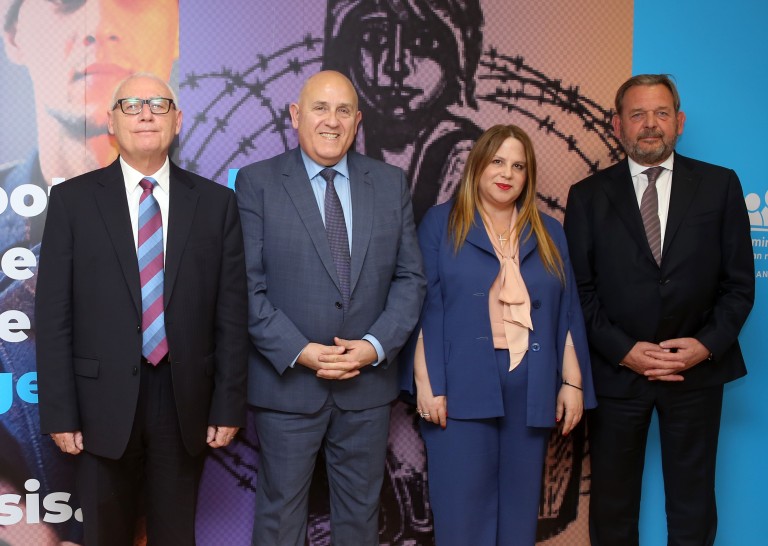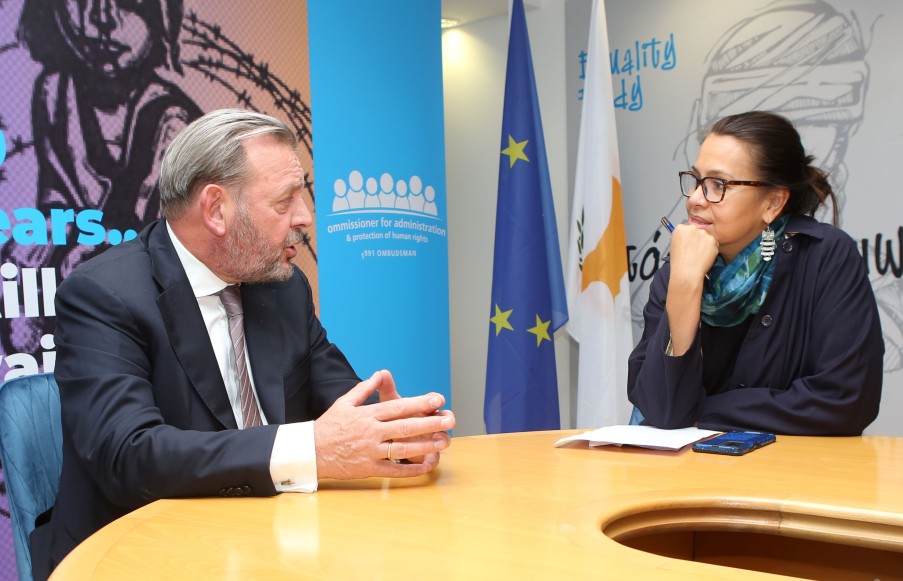

Shemaine Bushnell Kyriakides
The International Ombudsman Institute (IOI) is a global organization that brings together over 200 Ombudsman offices from more than 100 countries. These offices act as watchdogs, protecting people from unfair treatment, abuse of power, and government mismanagement. By holding authorities accountable and ensuring transparency, they help make governments more open and responsive to the public. Since its founding in 1978, the IOI has been a key player in supporting these efforts through training, research, and funding for local projects.
Today I visited Reinier Van Zutphen, the President of the IOI’s Board of Directors (European Region), who is in Cyprus for a two-day regional board meeting, which also includes our very own Ombudsman for Human Rights in Cyprus, Mrs. Maria Lottides.
A former judge, Mr. Van Zutphen has dedicated his life to advocating for the underprivileged—a mission that reflects the very essence of what Ombudsmen strive to achieve in countries around the world.
In Europe, one of the most essential institutions for upholding fairness and accountability is the Ombudsman. Reinier Van Zutphen is on a mission to ensure that this institution remains a voice for the voiceless, especially for those who often get left behind—people facing poverty, disabilities, or systemic unfairness. The Ombudsman isn't just a figurehead in an office; it's a bridge between citizens and governments, working tirelessly to address concerns and push for real change.
“We’re not here to replace governments; we’re here to support them, to make sure they understand what their citizens need and to hold them accountable when necessary.”
At its core, the Ombudsman helps to restore justice. Whether it's fighting for housing, ensuring that people have access to their basic rights, or making sure that individuals get the social benefits they deserve, the goal is simple: to make sure no one falls through the cracks. Van Zutphen explains, “We focus on the people who need us most, especially those who feel unheard or forgotten.”
Taking to the Streets
One of the biggest challenges that Van Zutphen and the IOI face is reaching the people who need help but don’t know where to turn. It's not enough to wait for people to come to them. “The people who need us most—the marginalized, the disadvantaged—are often not the ones who reach out,” he says. “So, we go to them.”
"This isn't just about setting up offices and hoping people show up. It’s about going out into communities, engaging directly with people, and making sure that no one is left out." For Van Zutphen, this means sometimes hitting the streets or even using creative methods, like driving around to meet people where they are. “Outreach is about helping people voice their needs, not just speaking for them,” he explains.
This hands-on approach to outreach is something Van Zutphen takes very seriously. He and his colleagues are developing a "best practices guide" to help Ombudsman offices around the world better reach the people who need help the most. At a conference held last May in The Hague, outreach was one of the key topics, and the IOI is committed to helping Ombudsman offices globally better serve their communities.
A Strong Example in Cyprus
Maria Lottides, Cyprus' Ombudsman for human rights, is a strong advocate for outeach and engaging in vulnerable communities. Van Zutphen highlights her outstanding efforts, despite managing multiple roles with a small team. "Maria Lottides is doing an excellent job in Cyprus," he says. "She’s managing a vast workload with a small staff of just 30-35 people, yet she ensures the office’s impartiality and independence while serving the needs of the entire population. Her dedication is a clear example of what it means to be a committed Ombudsman."
Lottides oversees not only the Ombudsman’s duties but also equality, human rights, and disability rights in Cyprus. Van Zutphen praises her ability to handle multiple mandates effectively, navigating challenges with determination and focus. "It’s not an easy task, but Maria’s leadership ensures that Cyprus’ Ombudsman office remains a trusted institution," he adds.
Plans for 2025
Looking to the future, the IOI has big plans for 2025. Van Zutphen emphasizes the need for stronger connections with national governments. “We want to meet with parliaments and government leaders more than just once or twice a year,” he says. “Our goal is to have more frequent conversations about the challenges people are facing, so we can help make lasting changes.” This includes not just sharing concerns but also making sure that ombudsman offices’ recommendations lead to concrete action, especially in areas like social justice, education, and children’s rights.

A Success Story: Digital Tax Filing in the Netherlands
A recent example of how the Ombudsman has made a tangible difference involves the digitalization of tax filing in the Netherlands. As more government services moved online, many elderly people and others with low literacy found it impossible to navigate the system. In just two weeks, the Ombudsman received 4,000 complaints. Van Zutphen and his team pushed for change, urging the government to offer alternatives to digital tax filing. The result? Authorities agreed to provide both digital and non-digital options, ensuring that everyone, regardless of their abilities or circumstances, can file their taxes.
Van Zutphen shares, “We want digital progress, but it has to be inclusive. We can’t leave people behind just because they struggle with technology.” This case highlights the Ombudsman’s ability to advocate for the most vulnerable while ensuring that government services remain accessible to all.
Building Stronger Connections
As the IOI continues its work, it remains focused on ensuring that no one is left behind in the face of an ever-changing world. The next big step in this mission is making sure that Ombudsman offices aren’t just helping people during crisis moments but are actively working with governments to improve systems long-term.
Van Zutphen wants to see regular interactions between Ombudsman offices and national parliaments to ensure that citizens’ voices are heard, and their rights are protected. He adds, “We’re not here to replace governments; we’re here to support them, to make sure they understand what their citizens need and to hold them accountable when necessary.”
The work of the International Ombudsman Institute is as much about outreach as it is about change—creating lasting connections between citizens and governments to ensure that fairness and justice are not just ideals but everyday realities for everyone. And as Van Zutphen looks toward 2025, his vision is clear: to continue building that bridge, making sure that no one is left behind and everyone has the opportunity to be heard.































